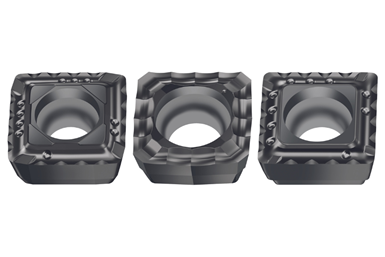Walter Indexable Drill Inserts Provide High Wear Resistance
The WNN15 drilling grade features a hard substrate, which provides high cutting-edge strength and sharpness on indexable inserts.
Walter’s low-adhesion WNN15 grade is now included in the company’s indexable insert drills. The drills that accept indexable inserts made of grade WNN15 include D4120, D3120, and B3212.DF. to B3214.DF in insert versions P4840, P2840 and LCGX.
The grade is primarily designed for drilling wrought or cast aluminum alloys (ISO N workpiece group). Applications for these alloys are mainly found in the aerospace and automotive industries, as well as in general mechanical engineering.
The drilling grade WNN15 features a hard substrate, which provides high cutting-edge strength and sharpness on indexable inserts. In addition to providing process reliability, the inserts offer a high level of wear resistance to enable long tool life, even at extremely high cutting speeds. Tool life can reportedly be improved by up to 200% compared to conventional drilling grades, depending on the application. These capabilities make drilling with the grade WNN15 indexable inserts more cost-effective than comparable polycrystalline diamond (PCD) tools.
A physical vapor deposition (PVD) coating is applied to the grade WNN15 inserts using the high-power impulse magnetron sputtering (HiPIMS) process to create a smooth, dense surface. The rake faces are also polished. As a result, chip evacuation is smooth and built-up edge is avoided on the tool/workpiece interface. The inserts feature four indexes per insert, providing cost efficiency.
Additionally, Walter has introduced uncoated polished grade WN15 with a fine-grained substrate also suitable for aluminum machining. This uncoated grade WN15 complements the coated PVD grade WNN15 described above but serves as an economical alternative with approximately 30% lower cost per cutting edge, according to the company. The drills that accept WN15 grade inserts include D4120, D3120 and B3212.DF. to B3214.DF in insert versions P4840, P2840 and LCGX.
Related Content
-
Starting Small with Automation
Quick-change workholding and flexible robotic automation started this small shop on the path to success.
-
Tool Path Improves Chip Management for Swiss-Type Lathes
This simple change to a Swiss-type turning machine’s tool path can dramatically improve its ability to manage chips.
-
Automation Breakthroughs Revolutionize Precision Machining for Complex Parts
Marubeni Citizen-Cincom delivers custom solutions to address some of the biggest challenges in precision machining from handling small parts, to robot integration and unique tooling needs.















